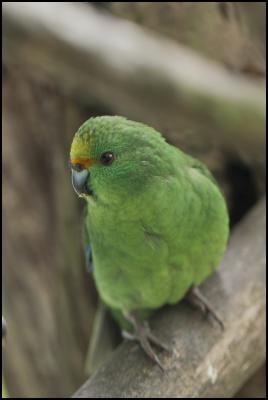Trap upgrade to protect endangered parakeet
Hon Maggie Barry
Minister of Conservation
Hon Nicky
Wagner
Associate Minister of Conservation
27 April 2017 Media Statement

Orange Fronted (Parakeet)
Kakariki credit SBernert
Conservation Minister Maggie Barry and Associate Conservation Minister Nicky Wagner have announced a major upgrade and extension to the trap network in Canterbury to protect the critically endangered orange-fronted parakeet.
“This bird is the rarest of our five parakeet species, with the population between 200 and 400, so we installed 500 self-resetting traps in Lake Sumner Forest Park last week as part of DOC’s Battle for our Birds programme,” Ms Barry says.
“We want rat and stoat numbers down to a level where the vulnerable hole-nesting parakeet can successfully breed and the population grow. Conservation measures like these will help us become Predator Free by 2050 and vastly improve the prospects for endangered species.”
“All up 1450 Goodnature traps, which reset up to 24 times before needing to be reloaded manually, and 1700 DOC-200 trap boxes will be added to the network, extending the trap line by 206 kilometres, at a cost of more than $860,000.”
The orange-fronted parakeet is found in only three valleys on mainland New Zealand — in part of the Lake Sumner Forest Park and the Hawdon and Poulter Valleys in Arthur’s Pass National Park.
Ms Wagner says 200 more traps will go into Hurunui next month and 570 into Poulter Valley around the same time. The DOC-200 traps will be installed in the Hawdon and Poulter Valleys in the next 12 months.
“DOC is using this latest technology to bring the trap network up to best practice standards. The extended network will also bring us closer to our 2025 goal of an additional one million hectares of mainland New Zealand under predator control,” Ms Wagner says.
“Rolleston Prison offenders are building the boxes that hold the DOC-200 traps as part of DOC’s Good to Grow partnership with the Department of Corrections.”
Background:
• DOC manages the risks to the parakeets by intensively monitoring predator numbers in all three valleys and undertaking pest control using a combination of traps and aerial 1080 when necessary.
• The Isaac Conservation and Wildlife Trust has a captive breedingprogramme for orange-fronted parakeets and in recent years DOC has been releasing captive-reared birds to supplement the wild mainland population.
• ‘Insurance’ populations of orange-fronted parakeets have been established on four predator-free islands: Chalky Island in Fiordland, Blumine and Maud islands in the Marlborough Sounds and Tūhua in the Western Bay of Plenty.


 Gordon Campbell: On The Making Of King Donald
Gordon Campbell: On The Making Of King Donald Fire and Emergency NZ: Older People Are More Likely To Die In A House Fire This Winter - Check They Are Fire Safe Today
Fire and Emergency NZ: Older People Are More Likely To Die In A House Fire This Winter - Check They Are Fire Safe Today The Reserve Bank of New Zealand: Statement from RBNZ chair Neil Quigley about OIAs on Adrian Orr's resignation
The Reserve Bank of New Zealand: Statement from RBNZ chair Neil Quigley about OIAs on Adrian Orr's resignation Deep Sea Conservation Coalition: Protected Corals Destroyed In Six-Tonne Bycatch “Disaster” From A Single Bottom Trawl
Deep Sea Conservation Coalition: Protected Corals Destroyed In Six-Tonne Bycatch “Disaster” From A Single Bottom Trawl Aroturuki Tamariki: Report On Outcomes For Tamariki And Rangatahi Māori In The Oranga Tamariki System – A Story Of Consequence
Aroturuki Tamariki: Report On Outcomes For Tamariki And Rangatahi Māori In The Oranga Tamariki System – A Story Of Consequence Fire and Emergency NZ: Unsafe Driver Behaviour Putting Firefighters At Risk
Fire and Emergency NZ: Unsafe Driver Behaviour Putting Firefighters At Risk Andrew Little: Andrew Little Commits To Pay Equity For WCC Library Assistants
Andrew Little: Andrew Little Commits To Pay Equity For WCC Library Assistants


